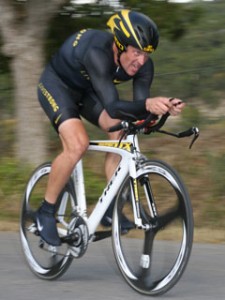Editor’s Note: Way Off the Grid is a satire feature of Off the Grid News. While the articles in this section may deal with current events, they are meant to portray these topics in a satirical and humorous light.
 ST. LOUIS – After insurmountable evidence of doping led companies such as Nike to cancel lucrative endorsement deals with cyclist Lance Armstrong, other corporations have rushed to embrace his newfound image. The agricultural biotechnology giant Monsanto began negotiating with Armstrong on Wednesday for a multi-million dollar deal to represent their controversial lines of genetically modified soybeans, peanuts, corn, cotton, and other crops. “We believe Lance to be a perfect fit for our products,” said Monsanto spokesperson Nick Myers. “He is not afraid of chemicals. He is a risk taker. He can keep a straight face. That is the soul of Monsanto.”
ST. LOUIS – After insurmountable evidence of doping led companies such as Nike to cancel lucrative endorsement deals with cyclist Lance Armstrong, other corporations have rushed to embrace his newfound image. The agricultural biotechnology giant Monsanto began negotiating with Armstrong on Wednesday for a multi-million dollar deal to represent their controversial lines of genetically modified soybeans, peanuts, corn, cotton, and other crops. “We believe Lance to be a perfect fit for our products,” said Monsanto spokesperson Nick Myers. “He is not afraid of chemicals. He is a risk taker. He can keep a straight face. That is the soul of Monsanto.”
But the bidding war for Armstrong’s endorsement has only just begun. Thursday, Monsanto biotechnology competitor DuPont had already met several times with Armstrong. DuPont wants him to be the face of their revolutionary Pioneer® hybrid-corn pesticide Herculex®XTRA, an in-plant insecticide that protects against western bean cutworms, black cutworms, corn borers, and corn rootworms. “Like our hybrid corn, Armstrong’s body is now largely made of synthetic chemicals, and both will taste great for a long time to come,” said DuPont’s vice president of marketing, Scott Granger. “Armstrong is a living pesticide. His body automatically fights off all sorts of aging, like our Herculex®XTRA.” DuPont envisions a series of television commercials showing Armstrong constructing a boat out of hybrid corn and another with a glowing aura of his sweat repelling crop insects.
Armstrong’s former endorsement companies have not been silent about the potential new deals. Nike’s vice president of global sourcing, Sandy Campion, explained that “Nike understands the messiness of life. We’re not perfectionists. We know the necessity of looking the other way in regard to overworking small Asians, but Armstrong, like, did this right in our faces. That’s not right.” RadioShack spokesperson Darren Bruner said, “I am a big fan of many types of latex corn, so I think it’s a poor marketing move to associate it with someone who has fallen off his bike several times.”
On Monday, Armstrong himself addressed the potential endorsement deals. “I don’t know what you’re talking about. I have never, ever had a meeting with either Monsanto or DuPont.” He explained that he ate only organic cotton and no corn. He said the people spreading endorsement rumors are “vindictive and proceed without the slightest evidence.” Later that day, Armstrong spokesperson Alicia Van Nesson explained that, “in answer to earlier inquiries, Mr. Armstrong didn’t understand the question was about that Monsanto or that DuPont. He thought the reporters were talking about restaurants. He absolutely has no pending endorsement deals with restaurants. None whatsoever.” She conceded that Armstrong will most likely sign a massive contract for genetically modified food within the week.
Sources within Monsanto say that the firm hopes to speed up the endorsement deal so that Monsanto might feature Armstrong in their battle against California’s Proposition 37, known as the Right to Know Genetically Engineered Food Act. The proposition would require genetically modified organisms to be labeled on food items, the first such requirement in the U.S., the last in Europe. Monsanto has spent $4.2 million to undermine the proposition, as have other genetically modified food companies. “Armstrong knows how bad labeling can hurt a person’s reputation and hard work. We want him to bring that empathy to this California battle,” said Monsanto’s Nick Myers.
DuPont has not counted itself out of winning Armstrong yet. “I can’t go into details, but we hope to sweeten our offer with an extraordinary promise, really extraordinary.” Granger went on to explain how he hopes “old-fashioned attitudes” will soon fade so that all sorts of athletes might be acceptable test subjects for DuPont pesticides. “We think that some of our products injected into Lance Armstrong will actually extend his life significantly. We think we could help him last to about 160 years old, and look the same as he does now. Who else could put that in an endorsement deal?” said Granger. When Armstrong was asked about his interest in living to 160 years, he said, “I will never use synthetic products, but, yes, I can see myself winning my sixteenth Tour de France when I’m 139 years old, assuming people grow up a bit and become less vindictive.”
©2012 Off the Grid News
 Off The Grid News Better Ideas For Off The Grid Living
Off The Grid News Better Ideas For Off The Grid Living



